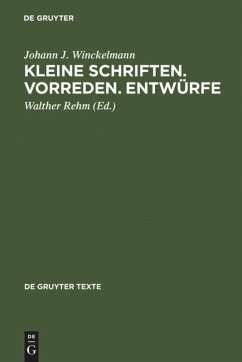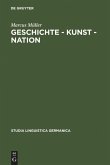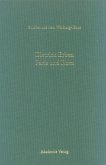Lessing called him a "man of letters", for Herder he was a "Littérateur and connoisseur". Even during his lifetime (he was born in Stendal in 1717 and died in Trieste in 1768) Johann Joachim Winckelmann was regarded as the most significant connoisseur of antique art in Europe. After spending a long time in Rome as an independent scholar and librarian, during which he maintained close relations with learned circles there, he spent the last years of his life as a Senior Custodian of all ancient monuments in and around Rome. In 1768, while travelling back from Germany, he was murdered in Trieste. He is regarded as one of the first archaeologists and the founder of the modern discipline of art history. His writings on antique art and its imitators are today still fascinating standard works.
This new edition of the Kleine Schriften (1755-1763) at an affordable price offers an excellent opportunity to be inspired by some of the most important and influential of this classical humanist's works. They reveal his immense cultural and historical significance: the idealistic image of classical antiquity revered by both the Classical and Romantic movements in Germany can only be explained against the background of his pioneering "Gedanken über die Nachahmung der Griechischen Wercke". Rilke's famous sonnet on the archaic torso of Apollo would have been inconceivable without Winckelmann's hymn on the Belvedere Apollo.
The volume contains a foreword by the President of the Winckelmann Society, Max Kunze, and is introduced by the archaeologist Hellmut Sichtermann. Those readers seeking information on the sources are admirably served with the comprehensive commentary provided by the literary historian Walter Rehm.
This new edition of the Kleine Schriften (1755-1763) at an affordable price offers an excellent opportunity to be inspired by some of the most important and influential of this classical humanist's works. They reveal his immense cultural and historical significance: the idealistic image of classical antiquity revered by both the Classical and Romantic movements in Germany can only be explained against the background of his pioneering "Gedanken über die Nachahmung der Griechischen Wercke". Rilke's famous sonnet on the archaic torso of Apollo would have been inconceivable without Winckelmann's hymn on the Belvedere Apollo.
The volume contains a foreword by the President of the Winckelmann Society, Max Kunze, and is introduced by the archaeologist Hellmut Sichtermann. Those readers seeking information on the sources are admirably served with the comprehensive commentary provided by the literary historian Walter Rehm.








